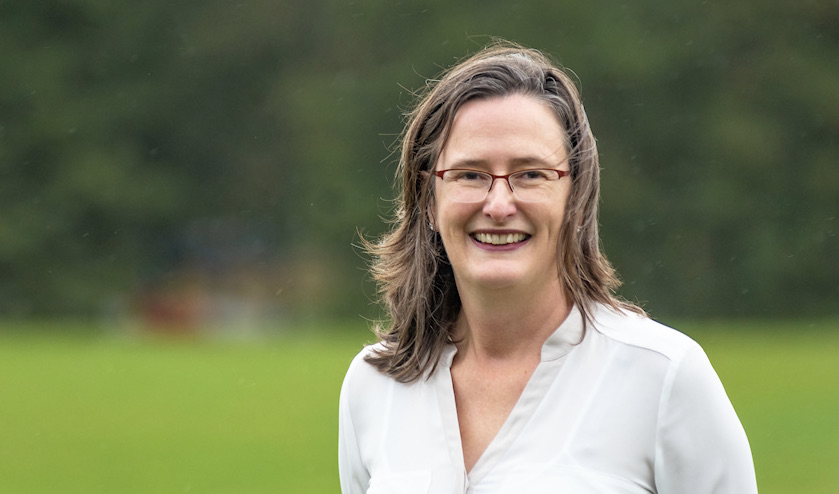
Earlier today, Valérie Orsat was named one of 12 recipients of an ‘Engineering and Physical Sciences’ Suffrage Science award.
The timing of the award – announced on International Women’s Day – is entirely intentional. Founded by the MRC London Institute of Medical Sciences (LMS) ten years ago, the Suffrage Science awards celebrate women in science for their outstanding scientific research, communication work, and support of women in STEM. The original Suffrage Science awards went to women researchers in the life sciences. The engineering and physical sciences branch was added in 2013, and maths and computing in 2016.
What is truly unique about the Suffrage Scientists award is that each recipient receives a hand-crafted item of jewellery commissioned from students of the art and design college, Central Saint Martins-UAL. But rather than produce a new set of pieces for the next awards, each holder chooses who they would like to pass their award onto. This “relay” generates “an extensive ‘family tree’ of incredible scientists and communicators,” says the Suffrage Scientists press release.
Recognized for mentoring and research excellence
Orsat was selected by one of last year’s laureates, Professor Marzieh Moosavi-Nasab, a professor of Food and Science Technology at Iran’s Shiraz University.
“Valérie Orsat is an internationally-recognized expert in the area of functional foods and nutraceuticals in the field of global food security and safety challenges,” says Moosavi-Nasab. “Her current research explores the development of processing methods for enhanced production, extraction, and encapsulation of bioactive compounds for functional foods.”
“Being a successful woman in engineering is not only helping the recruitment of women in engineering, with the admission of 50 per cent women in the program during her years as department chair, but also the continued mentoring of female students and supporting their choices of pursuing careers in the profession,” notes Moosavi-Nasab.
“I was very surprised to be nominated for this award and I am very humbled and appreciative that Prof. Marzieh Moosavi-Nasab thought of me,” says Orsat. “In the process of this nomination, we had some discussions that brought to light our common research interests, which we may look in the future at opportunities to collaborate.”
Innovative and sustainable solutions to global food security challenges
Orsat is professor in the Department of Bioresource Engineering, and her research program addresses the broad spectrum of quality changes that occur during various stages of postharvest handling and food and bio-processing.
“The agro-bioresource engineers of today and tomorrow have their hands full with the need to come up with technologies and practices to improve agricultural production, reduce postharvest losses, improve the quality of the food we eat and make better use of marginal resources and marginal lands to effectively produce biomass for the biorefinery industry,” says Orsat. “Innovative and sustainable new approaches are the need of the hour.”
Orsat believes that bioresource engineering is essential in addressing some of the biggest challenges facing the world today.
“Millions of people worldwide are eating the wrong type of food for their health and for the health of the planet. This mismanagement of our diet is the leading cause of one in five deaths worldwide,” says Orsat. “We have to anticipate strategies to feed the growing population of tomorrow in a manner that ensures food security, nutrition and health for all while respecting environmental limits.”
“Food is the most powerful intersect between agriculture, industry, and health sectors that are essential to sustainable development. Creating an adequate supply-and-demand for 21st century food innovations, which enables individual and population diets that simultaneously support the health of people, the environment and our economies, will require transforming both our methods of innovation as well as our current practices from processors to consumers.”
Inspired by a magazine
Orsat says she has always been interested in science. “Perhaps initially out of curiosity, but principally wanting to explain how things work.”
She traces her interest in bioresource engineering back to her Cegep studies at Jean de Brébeuf. “I was reading the French version of National Geographic, called Geo, which had a whole issue on the future of agriculture,” she says. “It discussed what advances would be required to feed the planet and the need to reinvent how we do agriculture. I was fascinated and this is when I decided to apply to study in agricultural engineering (which later became bioresource engineering).”
As an established researcher, Orsat understands that she also serves as a role model for young women looking to pursue a career in science, particularly bioresource engineering.
“Mentoring students is very rewarding. I can see that my trainees are thankful for the support and guidance I provide,” she says. “My past students will come back and say, ‘When you told me this, it changed my life.’”
“The field and professional practice of bioresource engineering has been evolving in the past decades and is increasingly attentive to being an inclusive and safe environment for all individuals to flourish in,” Orsat says. “In the past decades, an increasing number of women chose to study in engineering, but they have not necessarily stayed within the profession. This is changing as women find their passion within the practice of sustainable engineering to feed the planet.”

What a great news! Highly deserving,
Felicitations! Valerie.